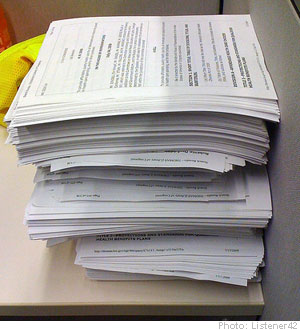 The 1,990-page length of the health reform bill is once again bringing forth demands that members of Congress be required to read the legislation before voting on it. While a seemingly reasonable demand, it is, in fact, a waste of time.
The 1,990-page length of the health reform bill is once again bringing forth demands that members of Congress be required to read the legislation before voting on it. While a seemingly reasonable demand, it is, in fact, a waste of time.
The reason becomes obvious the moment one actually reads legislative language. Here is a section I pulled at random from the health bill:
(a) AMENDMENTS TO THE EMPLOYEE RETIREMENT INCOME SECURITY ACT OF 1974.–
(1) REDUCTION IN LOOK-BACK PERIOD.-Section 701(a)(1) of the Employee Retirement Income Security Act of 1974 (29 U.S.C. 181(a)(1)) is amended by striking ”6-month period” and inserting ”30-day period”.
(2) REDUCTION IN PERMITTED PREEXISTING CONDITION LIMITATION PERIOD.-Section 701(a)(2) of such Act (29 U.S.C. 1181(a)(2)) is amended by striking ”12 months” and inserting ”3 months”, and by striking ”18 months” and inserting ”9 months”.
(3) SUNSET OF INTERIM LIMITATION.-Section 701 of such Act (29 U.S.C. 1181) is amended by adding at the end the following new subsection:
”(h) TERMINATION.-This section shall cease to apply to any group health plan as of the date that such plan becomes subject to the requirements of section 211 of the (relating to prohibiting preexisting condition exclusions).”.
What is immediately obvious is that none of this language makes the slightest bit of sense without reference to the underlying law that is being amended. To begin to comprehend what this language seeks to accomplish one would need to have a copy of ERISA as well. Then one would have to see what exactly these additional words do to change whatever section of law is being amended.
But this is just the beginning because many terms like “preexisting condition” have a precise legal definition that may be spelled out in some other law or changed in some other part of the legislation. Moreover, that definition may have been clarified in some way by government regulations or court cases that are not even referenced but may be critical to understanding precisely what the new legislation actually accomplishes.
For these reasons, reading an actual bill is a completely useless exercise for the vast majority of members of Congress and staff. They rely heavily on committee reports that are supposed to accompany all bills coming up for a floor vote. These reports are written by committee staff and are required to faithfully reflect the bill’s intent. They may contain important details, clarifications, data, citations to hearings, and supporting materials, such as a section-by-section analysis, that allow the legislation to be intelligible to non-lawyers and other non-experts.
In addition, both Republicans and Democrats in Congress have organizations that review all bills coming up for a vote, summarize them and offer political perspectives. Here, for example, is the House Republican Conference report on the health bill. If one’s party holds the White House, a member may find the Statement of Administration Policy to be important in understanding a bill and how to vote on it. Here is the SAP on the health bill. The Congressional Budget Office’s analysis may also be important. Here is its report on the health bill.
Finally, on important bills a member’s office is flooded with analyses by trade groups, think tanks, and vast numbers of lobbyists. In many cases they employ very high-powered lawyers who go through legislation with a fine-tooth comb and are more than happy to make their expertise available for free to any congressional staffer seeking guidance.
Unfortunately, even on important bills a lot of critical materials will be unavailable at the time of the vote. I could not find a committee report on the current version of the health bill. But in practice, most members pay little attention to such things anyway. In each party there are go-to members who specialize in particular issue areas–health, taxes, banking, energy, agriculture, whatever. In most cases, they are members of the committees with primary jurisdiction and more often than not are the chairman or ranking minority member. It is what these people say is in a bill that really matters for most members.
Also, most members learn quickly from experience that there are certain members who share their point of view and can be trusted. If one of them says support such-and-such bill or amendment, they know they will have the votes of some number of other members. The leadership knows who these people are and party whips will work with them to make sure that certain interests are protected. A bill’s managers may arrange to have statements inserted in the Congressional Record or engage in a colloquy on the floor that become an important part of the legislative history. Courts and the agencies tasked with implementing public laws rely on such things to determine congressional intent.
The point is this discussion is to show that actually reading a bill is not going to tell the average congressman or senator anything useful about it. Making it some sort of requirement for enactment simply wastes time that would be better spent absorbing summaries and analyses that tell members what the legislation is supposed to do.
Photo: Listener42
Disclaimer: This page contains affiliate links. If you choose to make a purchase after clicking a link, we may receive a commission at no additional cost to you. Thank you for your support!


Leave a Reply